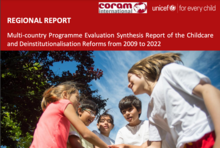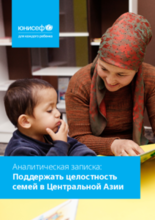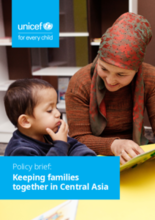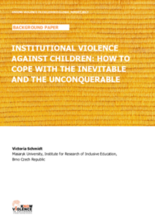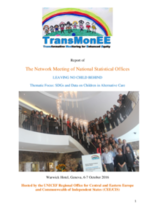Displaying 1 - 10 of 16
This report presents the main findings, conclusions, and recommendations of an evaluation of the child care and deinstitutionalisation reforms in seven countries in the Europe and Central Asia Region (Bulgaria, Georgia, Moldova, Montenegro, Northern Macedonia, Serbia and Tajikistan). The report offers valuable insights into the effectiveness of child protection systems and the transition from institutional care to family- and community-based alternatives. It highlights key achievements, lessons learned, and best practices, while also addressing the areas where further improvements are needed to ensure that every child can grow up in a nurturing, safe, and supportive environment.
Каждый ребенок имеет право расти в способствующей развитию семейной среде.
This UNICEF policy brief finds that an estimated 203 children for every 100,000 children live in residential care across Central Asia – almost double the global average of 105 per 100,000. In this brief, UNICEF proposes seven policy recommendations to facilitate the closure of large-scale institutions and transition to family-based alternatives to institutional care in Central Asia.
This global webinar will delve into the challenges, emerging research from Kenya, and practical country examples from Mozambique, Tajikistan and Peru. The webinar will highlight how children with developmental delays and disabilities can have the best chance to not only survive, but also thrive.
This paper explores the impact of international migration on school enrollment of children staying behind in Tajikistan, by using data from a large nationally representative household survey. The results show that migration of household members reduces the probability of enrolling in school by 10 percentage points for children who belong to households with migrants. The effect of parental migration is much larger than that of migration of other household members. Receiving remittances reduces the adverse impact of migration by only 1‒3 percentage points.
The purpose of this assignment is to operationalise the content of the Family and Child Support Centre Regulation, which now focuses on community-based support services for vulnerable families and children with the aim to prevent unnecessary institutionalisation of children and promote the right of each child to grow in a safe and supportive family environment.
UNICEF is seeking a Child Protection Specialist in Tajikistan.
This country care review includes the care-related Concluding Observations adopted by the Committee on the Rights of the Child as part of its examination of Tajikistan’s periodic report to the Convention on the Rights of the Child.
This paper, produced for the Know Violence global learning initiative, looks at the violence children experience in closed institutions in the Central Asian countries, specifically the former Soviet republics: Kazakhstan, Kyrgyzstan, Tajikistan and Uzbekistan.
This document summarizes the content of the 6-7 October 2016 Network Meeting of National Statistical Offices. The event comprised of a number of presentations on topics related to the SDGs and data on children in alternative care.

